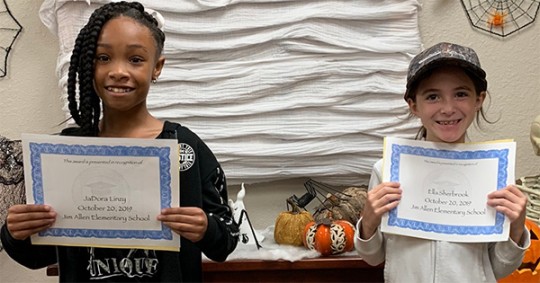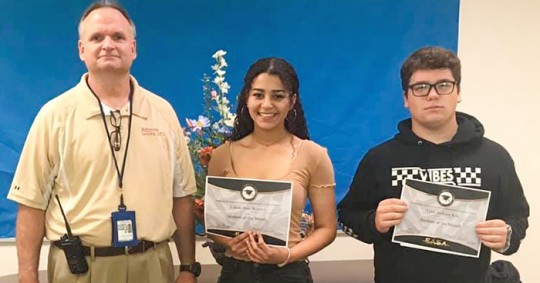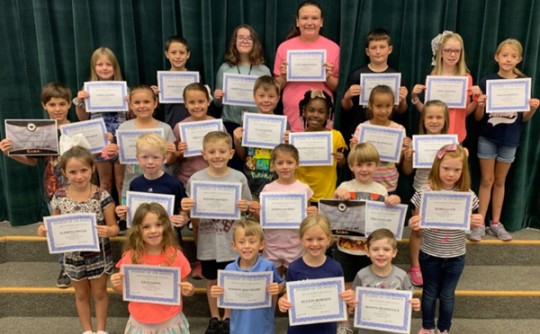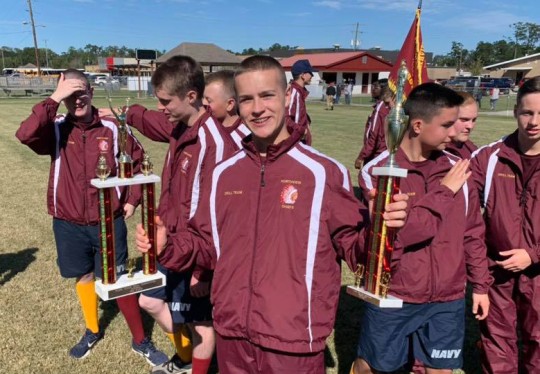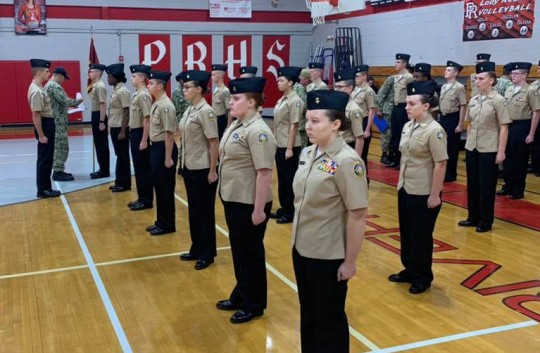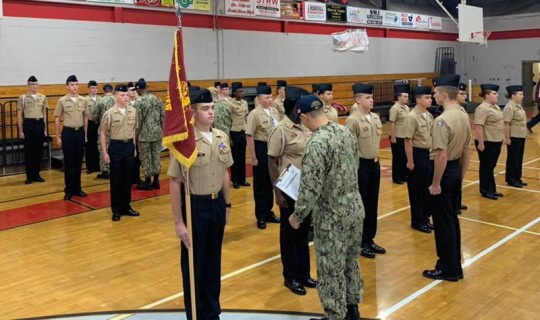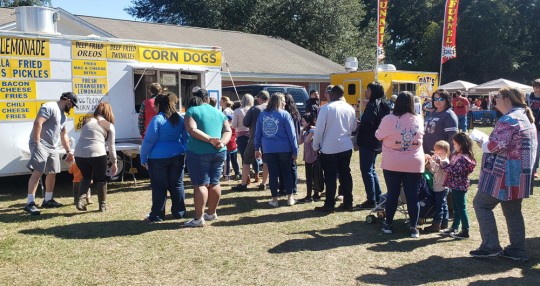Jim Allen Elementary Names October Students Of The Month
November 14, 2019
Jim Allen Elementary School has named Students of the Month for October. They are JaDora Linzy (pictured left) and Ella Sherbrook. Photo for NorthEscambia.com, click to enlarge.
Northview High Names Students Of The Month
November 12, 2019
Northview High School has named Students of the Month for October. They are Lillian Worden and Tyler Kite, pictured with Principal Mike Sherrill. Photo for NorthEscambia.com, click to enlarge.
Photo Gallery: Blue Angels Homecoming Show
November 10, 2019
The Blue Angels closed out their season Saturday under perfect skies at NAS Pensacola.
Over 45,000 spectators watched the high-flying show at Sherman field during the Homecoming Air Show.
For a photo gallery, click here.
NorthEscambia.com photos by Perry Doggrell, click to enlarge.
Thousands Participate In Making Strides Against Breast Cancer Walk
November 10, 2019
Thousands of people took part in the annual Making Strides Against Breast Cancer Walk in downtown Pensacola Saturday morning.
Over $280,000 was raised during the community event to fight for a cure to breast cancer.
An estimated 7,000 people took part in the four mile walk, many of which walked to honor loved ones fighting breast cancer or those that have lost their lives.
Pictured: Among the thousands take part in the Making Strides Against Breast Cancer Walk Saturday morning were the Tate High School softball team (above) and cheerleaders (below). Photos for NorthEscambia.com, click to enlarge.
Bratt Elementary Names October Students Of The Month
November 10, 2019
Bratt Elementary has named students of the month for October. They are:
Pre-K
Bowyn Heathcock
Peyton Roberts
Kindergarten
Kayson Southard
Charlie Trawick
Lilly Long
Isabella Coy
First Grade
Taylor Helton
Avaiah Colbert
Hayden Batson
Dillan Stuart
Second Grade
Audrina Miller
Lucas Daniel
Amora Rodreguez
Brooklyn Fountain
Third Grade
Briley Moore
Madison Rice
Pryce Flowers
Kyndal Hadley
O’Brein Holbein
Fourth Grade
Christian Roberts
Avery Trawick
Emma Grimes
Shane Alexander
Fifth Grade
Cate Greenwood
Hallie Emmons
Christian Caraway
Northview NJROTC Earns Awards At Louisiana Drill Meet
November 5, 2019
The Northview High School NJROTC earned a long list of awards Saturday at the Pearl River High School Drill Meet in Pearl River, Louisiana:
2nd place female curl ups — Sarius Davis
2nd place male curl ups – Keaton Brown
2nd place male curl ups overall
3rd place in the run overall
3rd place armed basic
1st unarmed basic
2nd place academics
3rd place color guard
2nd place personnel inspection
3rd place overall drill meet
Photos for NorthEscambia.com, click to enlarge.
Anne Fillingim Named Jim Allen Elementary Teacher Of The Year
November 5, 2019
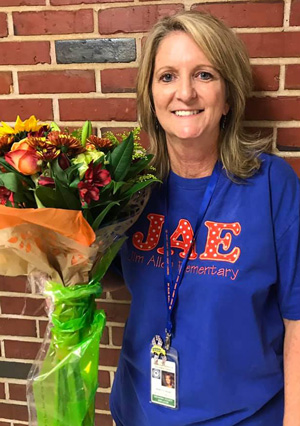 Anne Fillingim has been named Jim Allen Elementary Teacher of the Year. She is the guidance counselor at Jim Allen. Photo for NorthEscambia.com, click to enlarge.
Anne Fillingim has been named Jim Allen Elementary Teacher of the Year. She is the guidance counselor at Jim Allen. Photo for NorthEscambia.com, click to enlarge.
Tate High Recognizes Sherrie Swenson As Ms. Spirit
November 4, 2019
Tate High School has recognized Sherrie Swenson for raising almost $600 for Tate High School’s Ms. Spirit during Homecoming. The proceeds benefit Special Olympics. Submitted photo for NorthEscambia.com, click to enlarge.
Photos: Beulah Craft & Sausage Festival
November 3, 2019
The Beulah Craft & Sausage Festival was held Saturday at the First Baptist Church of Beulah.
Over 50 vendors took part, and there as plenty of food, fun for the entire family and live music. The Pine Forest High School NJROTC also assisted with the event.
For a photo gallery, click here.
NorthEscambia.com photos by Kristi Barbour, click to enlarge.
Her Daughter Was Found Murdered In Molino. Now Sue Brown Has Written A Book
November 2, 2019
Sue Brown’s daughter was found murdered, her body found face down by Gibson Road in Molino.
It was Sunday, April 30, 2017, when 38-year old Anna Louise Brown was shot and killed; the search for her killer continues.
Anna’s death, along with a medical scare, has led Sue Brown to write her first book “Mourning Song,” an autobiography and a testimony to God’s faith. The book is available on Amazon.
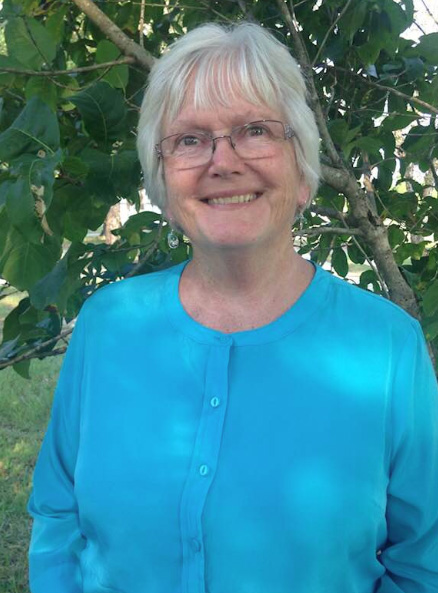 Our desire in sharing this book, our story, is to encourage, offer hope and faith to others who are struggling with their own crisis in life, whether grief, a medical diagnosis, or other life altering event,” Brown said.
Our desire in sharing this book, our story, is to encourage, offer hope and faith to others who are struggling with their own crisis in life, whether grief, a medical diagnosis, or other life altering event,” Brown said.
In her debut autobiography, Brown has written a concise and compelling narrative of her life. Focusing on two main crises that her family experienced, she has expressed with heartfelt emotion the highs and lows of these events and how they have impacted her family, friends and community.
The resolve and determination to rise from the ashes of grief and heartache to hope and joy, motivated her family to keep going toward healing and wholeness. Sustained by her faith, the author shares a riveting and encouraging, hope filled, healing message to her audience. She desires to be a blessing and help to all those who read her story and may travel a similar journey of their own.
From the book:
“Our story is written one moment, one word, one line, and one paragraph … one chapter at a time. It is written on the litmus paper of life, tested and proven over and over again with many joys, momentous occasions, and happy moments. And then, there are the unexpected events that alter our lives forever, leaving us with shredded heart and soul, a broken and empty vessel, an innate drive to prove the power of a loving and living God; a Creator who loves, with much compassion, an abundance of grace and mercy, to bring forth emotional and spiritual healing with a desire to perfect anyone who will trust and be willing to be broken. Our experiences, whether good or bad, how we respond and react to them, speak to our families, neighbors, acquaintances and friends as to whom we are, what we are made of, what we believe. Our choices, our knee-jerk reactions to the events that happen in our lives, steer our lives for the better, or worse and will have what is sometimes called a domino effect on everyone we are in contact with.”


